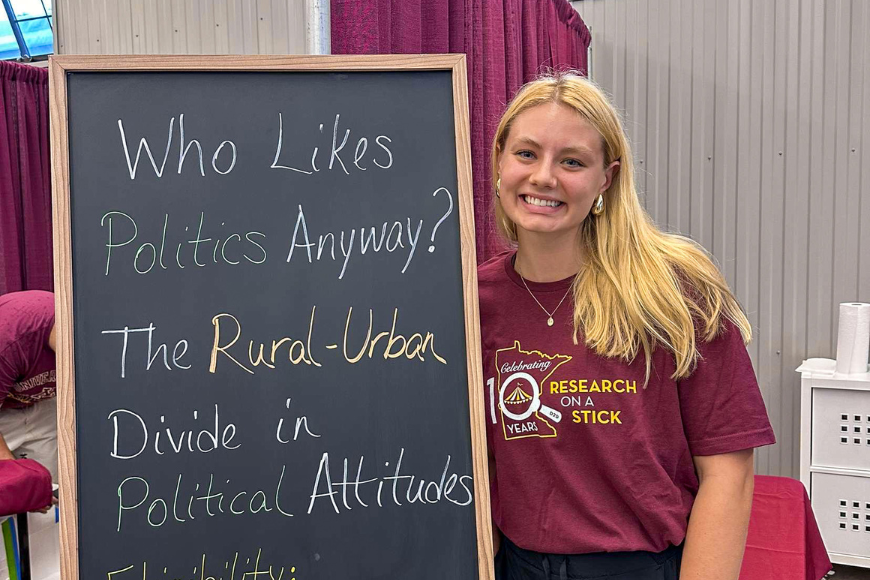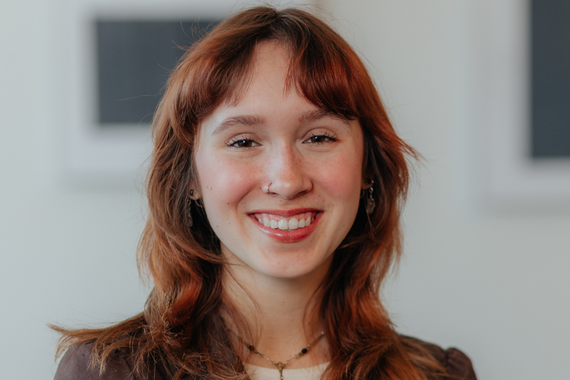"Who Likes Politics Anyway?" Researching the Rural-Urban Divide at the MN State Fair
Brianna Kreft is a second year graduate student in the Department of Political Science studying American politics and political methodology. This summer, she brought her research project, "Who Likes Politics Anyway? The Rural-Urban Divide in Political Attitudes," to the Minnesota State Fair. Read the below Q&A to learn more about Brianna's research and experience at the fair.
What are the primary issues and questions you are exploring in this research project?
My primary research question is how does "ruralness" affect political trust and efficacy during US elections? I'm interested in what type of "ruralness"—whether that be rural identity, consciousness, or simple membership—leads to a feeling of political disenfranchisement among rural people. And, how this relationship manifests during election season.
How did you become interested in this area of study?
I got interested in rural politics due to personal experience. I grew up in Elbow Lake, Minnesota, which is a town of 1,200 people. Growing up, I saw first-hand how rural people have their own way of thinking, especially when it comes to politics. Yet, I have had many life experiences and influences that have shown me a more "urban" way of thinking about politics. I find myself at a crossroads, being able to relate to both sides. This has led me to explore why this divide exists and what can be done to eliminate it.
What is the importance of this topic?
The rural-urban divide has worsened over the years. It's led to more "tribalism" between rural and urban Americans, to the point that it is difficult to have open conversations about politics. This is bad for democracy. It is also poor democratic norms when certain populations do not trust the government or feel that they can't participate in politics. That is why I chose political trust and efficacy as my dependent variables. Both are important attitudes for a healthy democracy. This research will help us better understand which rural people feel the most disenfranchised from politics—and, more importantly, why.
How are you conducting your research? What methods are you utilizing?
I am conducting this research using two different data collections: The first is from the Minnesota State Fair. The University of Minnesota sponsors the Driven to Discover (D2D) Research Program that allowed me to conduct research at the fair. The second collection will be coming from the political psychology pro-seminar survey. I am using observational data, collected via surveys.
What have been the key takeaways from your research?
My biggest takeaways have been related to the research process itself. Conducting research at the fair meant I interacted with all different types of people, with various political opinions. I had to show patience and kindness with each participant, especially if they were wary of my project or research in general. But everyone was polite and eager to learn. This showed me the importance of meeting people where they are when it comes to politics and political research. Being approachable and open-minded is key to interacting with research participants. I also learned what a realistic timeline looks like for research and how to organize a research team.
What has been your experience working with Professor Paul Goren on this project?
It's been great! I asked Professor Goren to be my advisor on this project last spring. I've been able to stay very independent with the work, but he has always been available to me if I have questions. He has helped me finalize my survey questions and offered feedback on my paper drafts. I'm very grateful for his mentorship.
How did you become involved in sharing your research at the Minnesota State Fair?
I've known about the D2D program since I was young. My family and I would make a stop at the booth each year when we went to the fair to participate in the studies. Then, when I became a grad student and realized I wanted to focus on rural politics, I thought back to the D2D program. The State Fair attracts both urban and out-state Minnesotans—it is the great Minnesota get-together, after all! This is a great way to reach a geographically diverse audience. Also, it's just fun to be the one asking questions when I used to answer them.
More political science students, or CLA students in general—both undergraduate and graduate—should take advantage of the D2D program. It's a great opportunity that is underutilized!
What kind of conversations did you have at the State Fair? Did you gain any insights from the visitors you talked with?
Despite being such a contentious topic—politics always is—I had very polite and informative conversations at the fair. I got feedback from some participants on the survey questions themselves, which is great because this collection will act as a measure validation for my coming pro-seminar collection. After taking the survey, participants shared their own research ideas on the subject, or even just books they thought I should read. I made sure to have a notebook on hand to jot down their insights.
What are your next steps for this project?
I will use the fair data to validate my measures for the second data collection coming from the pro-seminar survey. I will work on this project throughout the year, with hopes of sending it out for publication in the spring/summer. I will present my findings this winter at MPSA.

